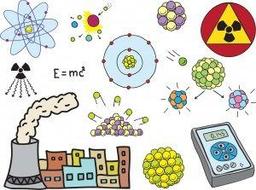
25.01. Nuclear Activity
Quiz by Kelly Gallagher
Feel free to use or edit a copy
includes Teacher and Student dashboards
Measure skillsfrom any curriculum
Measure skills
from any curriculum
Tag the questions with any skills you have. Your dashboard will track each student's mastery of each skill.
With a free account, teachers can
- edit the questions
- save a copy for later
- start a class game
- automatically assign follow-up activities based on students’ scores
- assign as homework
- share a link with colleagues
- print as a bubble sheet
17 questions
Show answers
- Q1__________ is the spontaneous emission of rays or particles from certain elements.isotopesphotosynthesischemical reactionsradioactivity30s
- Q2___________ refers to the rays and particles emitted from a radioactive source.nuclear radiationconductivityweightmass30s
- Q3Nuclear reactions begin with unstable isotopes, known as ___________________.cis-isotopesheterotopesionsradioistopes30s
- Q4Atoms of radioisotopes become ___________ stable when changes occur in their nuclei.moreless30s
- Q5Nuclear changes are always accompanied by _______________.heatlarge amounts of energypoisonlight30s
- Q6_____________ reactions are not affected by changes in temperature, pressure or catalysts.ChemicalNuclearBoth nuclear & chemical30s
- Q7_______________ of a particular radioisotope cannot be slowed down, sped up or stopped.ChemicalNuclearBoth nuclear & chemical30s
- Q8_____________ are always spontaneous.Both nuclear & chemicalChemicalNuclear30s
- Q9radioactive decay of 2 protons and 2 neutronsbeta particlesalpha particlesgamma rays30s
- Q10radioactive decay of -1 chargebeta particlegamma rayalpha particle30s
- Q11radioactive decay that has no mass and no chargegamma raybeta particlealpha particle30s
- Q12_________ is the ability of radiation to pass through somethingIonization energyConductivityIsomerismpenetrating power30s
- Q13A reaction in which an atom's atomic number is changed is called ____________.isotoperisminfusiontransmutationtransferation30s
- Q14The rate at which radioisotopes decay is called its ____________.shelf lifehalf shelllife spanhalf life30s
- Q15Splitting of the nucleus, generating a large amount of energy is _______________.fusionfashionfastionfission30s